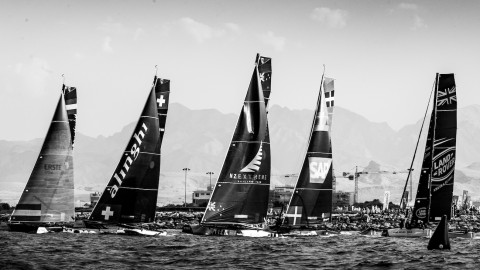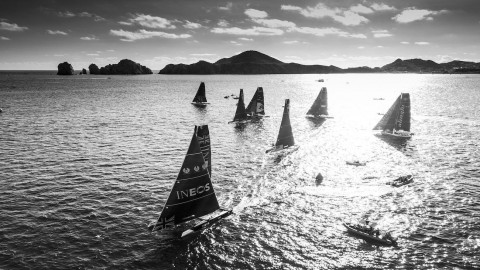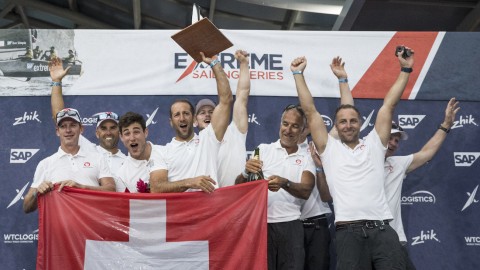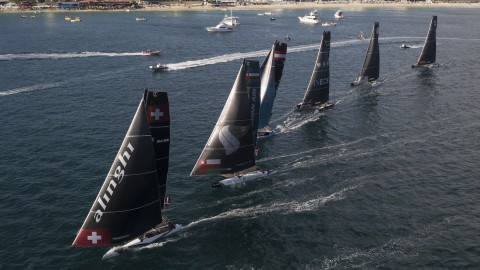Double Olympic champions Hagara and Steinacher on their golden success and the sailing in Rio
Helmsman Roman Hagara and tactician Hans Peter Steinacher are Austria’s sailing superstars, winning back-to-back Olympic gold medals in 2000 and 2004 and numerous world and European championships. More than a decade later, they’re still competing and innovating together, as well as mentoring the next generation of sailors. An interview with Austria’s most successful summer sport athletes.
Wednesday 17th August 2016

Helmsman Roman Hagara and tactician Hans Peter Steinacher are Austria’s sailing superstars, winning back-to-back Olympic gold medals in 2000 and 2004 and numerous world and European championships. More than a decade later, they’re still competing and innovating together, as well as mentoring the next generation of sailors. An interview with Austria’s most successful summer sport athletes.
This may sound like an obvious question, but what makes Olympic competition so special?
HPS: In the sporting world it’s very strange to spend three or four years preparing for one single event. That makes it very special before you ever compete, and actually some people can’t handle it. And as sailors, the Olympics is also the one possibility to be treated for three weeks on the same level with top athletes in other sports, like a Michael Phelps, a Usain Bolt. In other years it’s not that way, but at the Olympics, you have the possibility to win the same gold medal as all these superstars.
Your partnership almost didn’t happen: Roman had previously competed in the Olympics with his brother and was looking for a new teammate, but Hans Peter was going into his family’s business and had basically retired. What brought you together in 1997?
RH: I was looking for a crew who wanted to step up the game, and Hans Peter and I always had a good relationship when we were sailing in the Tornado class against each other. I just happened to be at his apartment during a ski holiday and asked him if he wanted to team up for a campaign. I was not expecting him to say yes. But he said he would talk to his family and from then on we’ve been sailing together. We know our roles and we fit very well; I think that’s why it’s been working long past our Olympic years now.
HPS: I had two young children and my life had changed. I’d been thinking, family, sailing, business – maybe it is a little bit much all together. But that’s my big success story. My family was so strong behind me that I was able to manage.
What were some of the other keys to your success? For example, you’re known for being innovators who pioneered the idea of creating your own custom sails.
HPS: Innovation, that’s something you can do in a sport like sailing. And I think the mentality of Austrians is made for finding ways to improve things and address technical issues, and to do the big work on shore like getting all the data for weather and currents and so on. We built our own support team, and we worked only with people who stayed with us the whole period in-between the Olympics. Having the same trainer, physical coach, mental coach and so on over the whole three- or four-year program helped a lot. They knew us very well.
So back when you won that first gold medal in Sydney, did your life change?
RH: It changed for a short period because we became well known, especially in Austria, where it’s rare to have a medal in the Summer Olympics. Everybody wants to see you, and it’s different – doing things like TV shows. But we were young enough to want to continue training for a second Olympics together.
HPS: After Sydney in 2000, Roman and I became first professional sailors here who could make a living from the sport. So we were the first both winning gold in sailing and creating a whole life around sailing that actually supported us. You didn’t stop there, but went back and fought hard for that second gold you earned in Athens, where Roman had the honour of carrying the Austrian flag in the Opening Ceremonies.
RH: When you come into the stadium for the first time, it’s really exciting. It’s unbelievable. And then to be in the flag area in front of all the other athletes of your own country… it’s really, really special.
Did your success have an impact on sailing in Austria?
HPS: Things really changed.
RH: There was more money coming to sailing and the whole sport improved. We got a sailing centre on an Austrian lake, for example.
Let’s bring things up to the present. You both have competed in Rio in the Extreme Sailing Series™. What can the Olympic sailors expect?
RH: Yes, we’ve been there racing by the Sugarloaf. The location is exciting, and especially because Brazil has earned Olympic medals in the past. It’s like competing in Sydney where the whole nation knows about sailing.
HPS: In Rio you can have light, medium or strong winds – and they have current as well – so you have to be prepared for all conditions. Of course in the media every second question is about the water quality. But this kind of [distraction] can kill your performance. It’s most important to lock it out of your head, which could be the difference between the winner and the rest. If I’d like to win the Olympics, that means I have to be the best on the water, whether the water is dirty or not.
Do you have any predictions on which sailing teams might actually be the winners at this Olympics?
HPS: Well, there are 10 different classes, so my favourites are still Australia and England, but at this time the French federation will be really strong as well, and in Austria we will have one gold medal and at least another medal. We have four really good boats there. RH: (laughs) I’d rather not make predictions on winners. However, I agree that two of Austria’s boats have really strong chances for a medal, even a gold, while the other two are good for the final and probably also have a chance for a medal. Austria is a small team but strong.
You two have been some of the sport’s biggest advocates for foiling, where catamarans lift off the water to “fly” at high speed like in the America’s Cup. You even work with young sailors to teach them foiling skills. But the Olympics hasn’t introduced a full foiling boat yet. Do you think that’s on the horizon?
HPS: There will be a full foiling campaign for sure. But the decision for the types of boats in the Olympics happens very early, and after the London Games in 2012 they already had to announce what would be used in 2016 in Rio. So they made that selection before the big success of foiling at the 2013 America’s Cup. I’m sure a full foiling boat will be on the starting line in Tokyo in 2020. RH: Definitely the Olympics will go to foiling. As we’ve seen in the America’s Cup and in the Extreme Sailing Series, foiling delivers something really interesting and exciting for the spectators, and foiling will step up the interest of the viewers at the Olympics as well. It’s very athletic and spectacular to watch, and it looks like it is the future of sailing.




